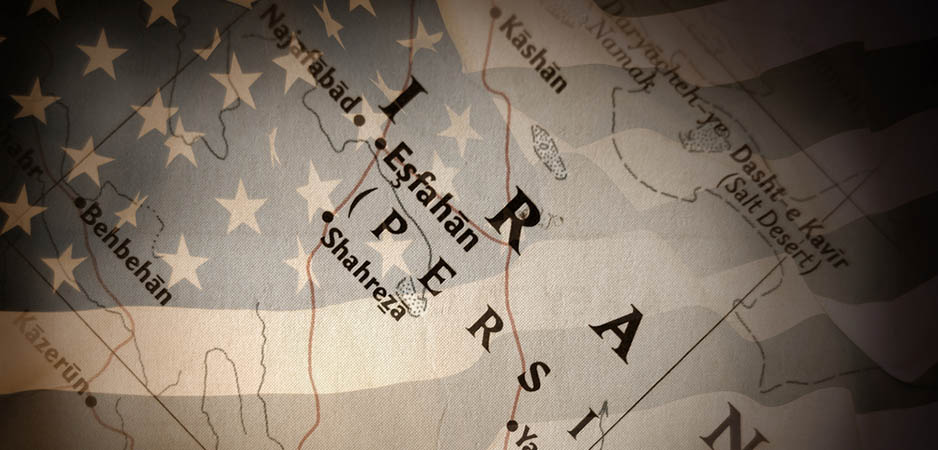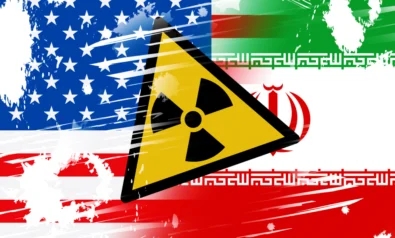On June 21, Fair Observer contributor Raman Ghavami expressed his concern with what he sees as Europe’s “desire to appease Iran.” At the same time, he complimented the Trump administration for its zeal that has led it to “call out Tehran on its destructive behavior.”
Ghavami should learn to be more careful when using the verb “appease,” which has become indelibly associated with Neville Chamberlain’s capitulation to Adolf Hitler in 1938. Although its literal meaning is innocent enough and merits classifying the idea of appeasement in the category of constructive approaches to resolving conflict, the verb “appease” has become a loaded term used to shame anyone who lacks the spirit of manly war in the face of a challenge that the speaker hopes their audience will tacitly equate with Hitler and Nazi Germany.
Cheap rhetoric aside, Ghavami focuses on the event that, in his eyes, justifies something better than appeasement: the claim that the Iranian government authorized the attack of two tankers in the Gulf of Oman. He writes: “The compelling evidence of Iran’s Islamic Revolutionary Guard Corps (IRGC) trying to cover its tracks when a bomb planted on one of the oil tankers targeted in the Strait of Hormuz on June 13 failed to explode, exemplified in disturbing footage released by the United States Navy, highlights the desperate measures Tehran is willing to resort to.”
Here is today’s 3D definition:
Compelling:
Without adequate evidence to convince an objective observer, but qualifying, through an act of seemingly logical projection, as a credible enough reason to support a foregone conclusion
Contextual note
Too many observers — including the Japanese and German governments — have objected that there is nothing compelling about the tanker attack narrative put forward by US Secretary of State Mike Pompeo.
Mehdi Hasan points out at that “the Japanese [ship] owner and the German foreign minister are both asking questions about [US Representative Adam] Schiff’s so-called ‘compelling’ evidence.” Interviewed by Hasan, Colonel Lawrence Wilkerson, who served as chief of staff to former Secretary of State Colin Powell, stated: “I wouldn’t believe any of it, as they’ve presented it, just as the Prime Minister of Japan didn’t believe it, or Germany, believe it. The credibility of [the] United States on intelligence is really low right now, as some of us predicted it would be.”
Until truly convincing evidence emerges, there is every reason to suspect that it may have more in common with the Gulf of Tonkin and the nonexistent Iraqi weapons of mass destruction (WMD) than with Pearl Harbor.
Author and former British Ambassador to Uzbekistan Craig Murray goes into fine technical detail to justify his appreciation that this was “the most unconvincing of false flags … yet another fake western power casus belli in the Middle East.” President Donald Trump himself papered over the subsequent provocation — the downing of a US drone — with the explanation that “somebody … made a big mistake” to justify his own failure to live up to National Security Adviser John Bolton’s and Raman Ghavami’s expectations and to engage militarily.
Many of the reasons Ghavami cites for calling out Iran’s “destructive behavior” do justify his deep disapproval of the regime. But while calling out Iran, what does he have to say about the many well-informed voices who call out Trump’s America for its even more obvious destructive behavior? Not just with Iran, which is only one example among others of a nation whose democratic government was overthrown by the US (in 1953) to be replaced by a sanguinary tyrant: Shah Mohammad Reza Pahlavi.
The consequences of that tyranny led to the shah’s overthrow in 1979, not by foreign operatives (MI6 and the CIA), but by the Iranian population. And that revolution led to a brutally destructive, costly war against Iran initiated by Iraq with unwavering US support, which was then accompanied by decades of crippling sanctions, to which Trump has added several turns of the screw.
Is that not destructive on a scale that Iran’s malign actions can’t even begin to compare with? In other words, while we’re at it, shouldn’t we focus on all forms of destructive behavior and strive, at all costs, to avoid applauding those who have been the most destructive?
Ghavami fails to mention what the current conflict is really about, after setting aside the commanding interests of the US itself. It boils down to the competition for power and influence between Iran and Saudi Arabia. Saudi expansion and its ambition over the region turns out to be far more evident than Iran’s. It is inextricably bound up with the balance of power in the greater Middle East that has produced a literally unholy coalition of interested parties alongside Saudi Arabia, which includes the US, Israel, the United Arab Emirates and Egypt.
Ghavami’s moral indignation about nations whose ambitions stretch menacingly outwards beyond their own borders would sound more legitimate if he didn’t intentionally exclude from consideration the most obvious and clearly most active actors. Ali Bakeer, writing for Al Jazeera, analyzes the actions of what he refers to as the “Saudi-Emirati axis,” which, beyond its incredibly destructive war in Yemen, has notably “sought to influence events in Sudan, Libya, and Algeria, as dangerous upheaval has gripped all three countries over the past few months.” This includes its attempt to “undermine popular movements for freedom and democracy with the intention of replicating the notorious Egyptian military dictatorship model.” Ghavami apparently sees nothing “destructive” in that program.
Bakeer sums up the outcomes the Saudis are hoping for: “Kuwait and Oman abandoning neutrality in the GCC [Gulf Cooperation Council] crisis and falling in line with the axis; Turkey and Iran being contained and weakened; Sudan, Libya and Algeria seeing the consolidation of military regimes loyal to Riyadh and Abu Dhabi; and Qatar caving in to pressure and submitting to Saudi and Emirati domination, after being isolated and abandoned by allies.”
Historical note
All propaganda seeks to be “compelling,” especially when it aims at justifying violence and destruction. The Economist published an article on February 6, 2003, reporting on Secretary Powell’s attempt to persuade the United Nations of the reality of Saddam Hussein’s nonexistent WMDs in Iraq. Demonstrating a degree of prudent hesitation that American and British politicians failed to respect, the journal nevertheless used the term “compelling” twice in the article: “Powell’s evidence against Saddam Hussein was compelling in some aspects, thin in others. … “Perhaps the most compelling part of Mr Powell’s speech described Iraq’s repeated lies to the weapons inspectors.”
A year later, The New York Times described “one of the most compelling sections of Mr. Powell’s presentation … what were believed to be decontamination vehicles and trucks covered with tarps more likely involved more benign commercial activity.” What one finds “compelling” today may be understood as pure bullshit when history allows the facts to emerge.
In an article published on February 6, 2003, with the title, “Powell’s One Good Reason To Bomb Iraq,” David Corn encapsulated and endorsed the true logic behind the Bush administration’s invasion of that country a month and a half later. Answering his own rhetorical question (“why send in the Marines now?”), Corn explained: “From the Bush administration’s perspective, there are two replies. One is, who knows what will happen if we wait? (Tough to argue with that.) The other is, we cannot dilly-dally because Saddam is (or could be) working with al Qaeda to hit the United States, and since he probably has some awful weapons at his disposal, he could pass WMD to the terrorists tomorrow.”
Though it may have been “tough,” it would have made a lot of sense for anyone interested in objectivity to dismiss the question “what will happen if we wait?” The real question with any war, should be: What will happen if we proceed? But that supposes we have already answered another question: Do we have any idea of what is likely to happen? And that supposes a further question: On what basis is that idea constructed? If it is speculative (e.g., they will strew roses in our conquering path) or pseudo-moral (e.g., we know they are evil and, as “a force for good,” we must eradicate evil wherever it raises its head), then the path to war should be definitively not just closed down, but barricaded. But Corn’s — and the Bush administration’s — reasoning was based on both of these premises.
And so are Raman Ghavami’s. His title alone demonstrates the point: “It’s Time the World Wakes Up to Iran’s Threat.” “It’s time” means “we mustn’t wait.”
Max Weber defined the state as a “human community that (successfully) claims the monopoly of the legitimate use of physical force within a given territory.” The policies the US has implemented in various regions and within specific nations around the world appear to have the hubristic ambition of claiming a global monopoly on violence. That provides the basis of Pompeo’s rhetoric, whether speaking of Iran or Venezuela.
The world has noticed this as Pew’s polling consistently highlights: “More people around the world see U.S. power and influence as a ‘major threat’ to their country.” We learn that “a median of 45% across the surveyed nations see U.S. power and influence as a major threat, up from 38% in the same countries during Trump’s first year as president.”
We really do need to wake up to Iran’s threat, but why not start by some of the other ones that are objectively quite a bit bigger?
*[In the age of Oscar Wilde and Mark Twain, another American wit, the journalist Ambrose Bierce, produced a series of satirical definitions of commonly used terms, throwing light on their hidden meanings in real discourse. Bierce eventually collected and published them as a book, The Devil’s Dictionary, in 1911. We have shamelessly appropriated his title in the interest of continuing his wholesome pedagogical effort to enlighten generations of readers of the news.]
The views expressed in this article are the author’s own and do not necessarily reflect Fair Observer’s editorial policy.
Support Fair Observer
We rely on your support for our independence, diversity and quality.
For more than 10 years, Fair Observer has been free, fair and independent. No billionaire owns us, no advertisers control us. We are a reader-supported nonprofit. Unlike many other publications, we keep our content free for readers regardless of where they live or whether they can afford to pay. We have no paywalls and no ads.
In the post-truth era of fake news, echo chambers and filter bubbles, we publish a plurality of perspectives from around the world. Anyone can publish with us, but everyone goes through a rigorous editorial process. So, you get fact-checked, well-reasoned content instead of noise.
We publish 2,500+ voices from 90+ countries. We also conduct education and training programs
on subjects ranging from digital media and journalism to writing and critical thinking. This
doesn’t come cheap. Servers, editors, trainers and web developers cost
money.
Please consider supporting us on a regular basis as a recurring donor or a
sustaining member.
Will you support FO’s journalism?
We rely on your support for our independence, diversity and quality.














